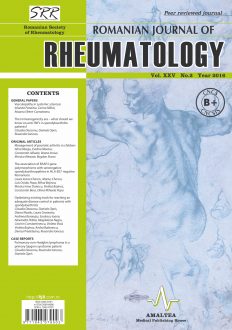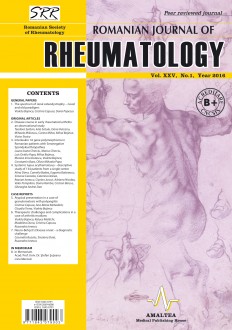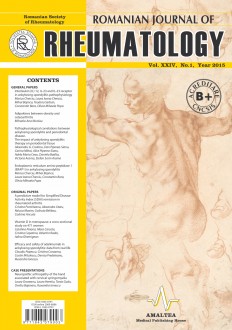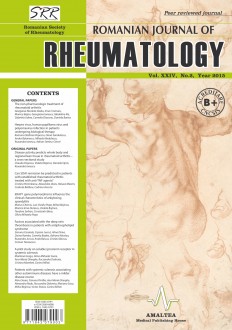SELECT ISSUE

Indexed

| |

|
|
|
| |
|
|
|

|
|
|
|
|
|
| |
|
|
HIGHLIGHTS
National Awards “Science and Research”
NEW! RJR has announced the annually National Award for "Science and Research" for the best scientific articles published throughout the year in the official journal.
Read the Recommendations for the Conduct, Reporting, Editing, and Publication of Scholarly work in Medical Journals.
The published medical research literature is a global public good. Medical journal editors have a social responsibility to promote global health by publishing, whenever possible, research that furthers health worldwide.
THE ASSOCIATION OF ERAP2 GENE POLYMORPHISMS WITH SERONEGATIVE SPONDYLOARTHROPATHIES IN HLA-B27 NEGATIVE ROMANIANS
Laura Ioana Cherciu, Marius Cherciu, Luis Ovidiu Popa, Mihai Bojinca, Monica Irina Dutescu, Violeta Bojinca, Constantin Bara and Olivia Mihaela Popa
ABSTRACT
Objective. Our aim was to investigate whether two ERAP2 single nucleotide polymorphisms (rs2910686 and rs2248374) influence spondyloarthritis (SpA) susceptibility in Romanians.
Methods. The case control study included 139 controls and 192 SpA patients. The two polymorphisms were genotyped by real time polymerase chain reaction (RT-PCR). The association tests for allele, genotype and haplotype frequencies for each polymorphism were performed with PLINK 1.9.
Results. The genotypes and allele frequencies of the two SNPs in general SpA group vs. controls showed no association except for a possible marginal one for the minor allele A of rs2248374 (p = 0.08). In HLA-B27 negative SpA cohort the minor allele (A) frequency (55.4%) of SNP rs2248374 was significantly higher than the one in HLA-B27 controls (44.5%) (p = 0.012). HLA-B27 negative carriers of minor allele A present a higher risk of developing SpA (p = 0.015). Also for the second ERAP2 gene variant investigated (rs2910686) the minor allele T frequency was significantly higher (46.5%) in HLA-B27 negative SPA patients when compared with HLA-B27 negative controls (36%) (p = 0.02). The haplotype of the minor alleles (AC) is a risk factor for HLA-B27 negative SpA (p = 0.019), while the haplotype of the major alleles (GT) is a protective one against the disease in HLA-B27 negative cohorts (p = 0.009).
Conclusions. Both ERAP2 gene polymorphisms investigated, especially rs2248374, influence SpA susceptibility, but this influence is limited only to the HLA-B27 negative individuals.
Keywords: ERAP2 gene, seronegative spondyloarthropathies (SpA), human leukocyte antigen (HLA)-B27, single nucleotide polymorphisms (SNPs)



